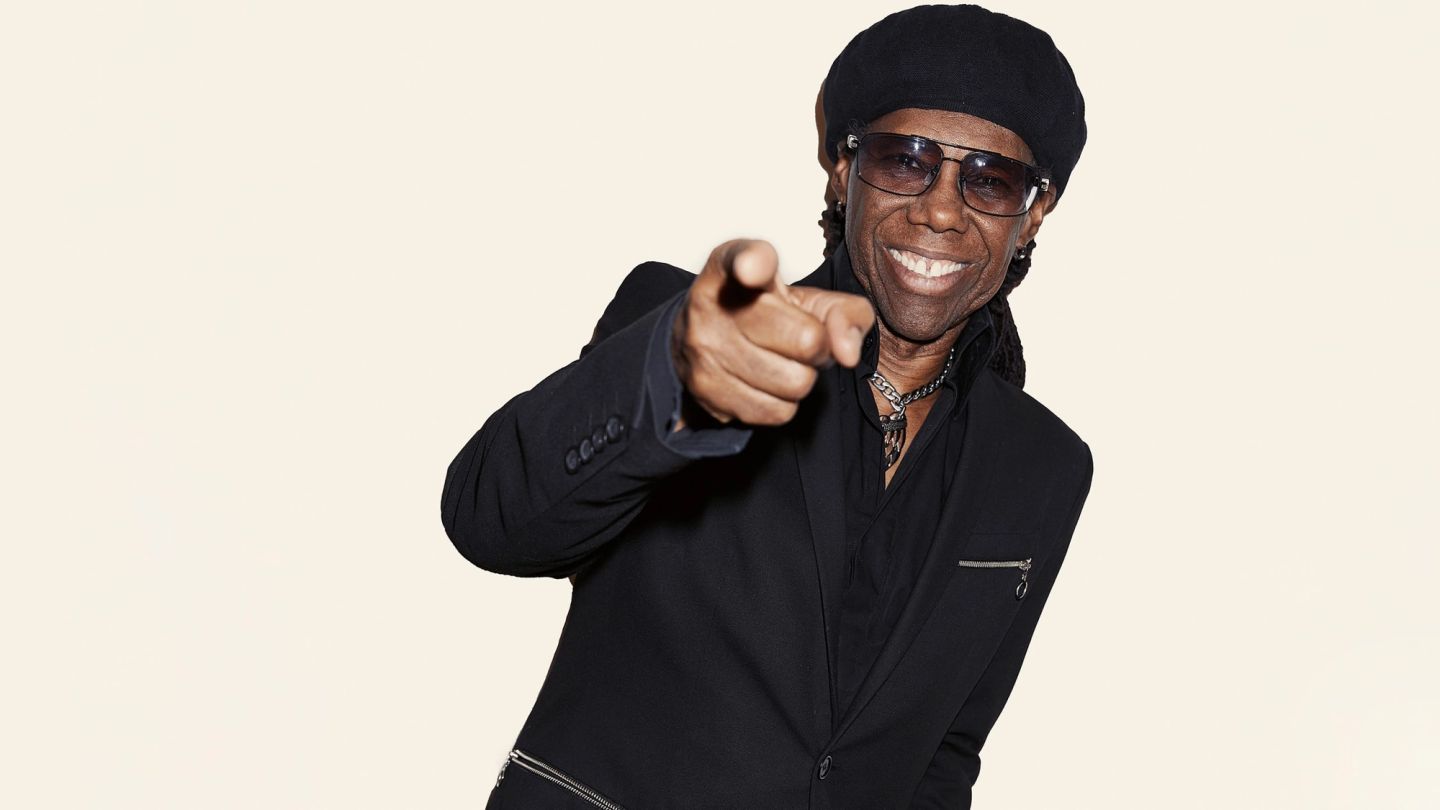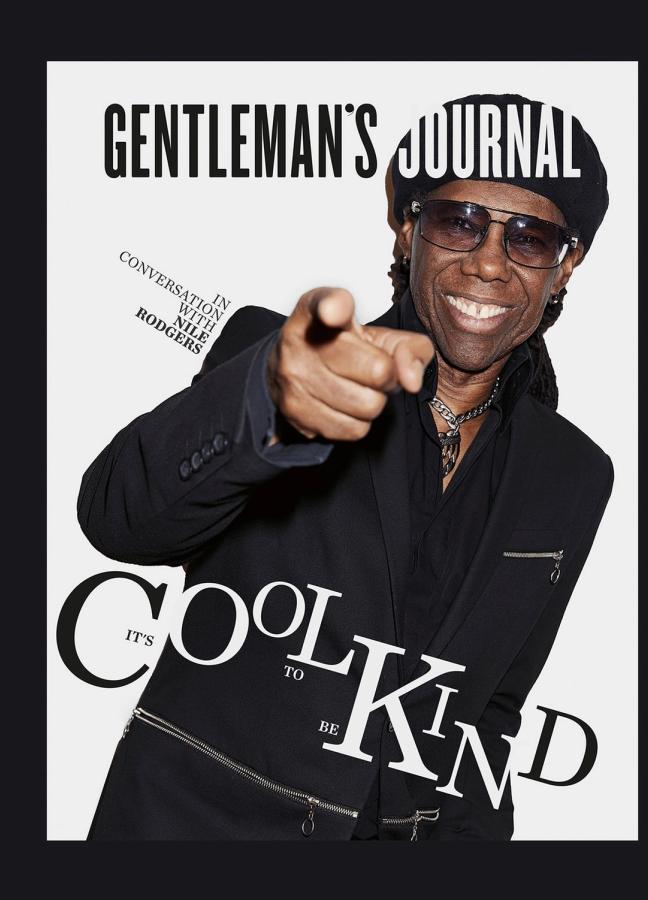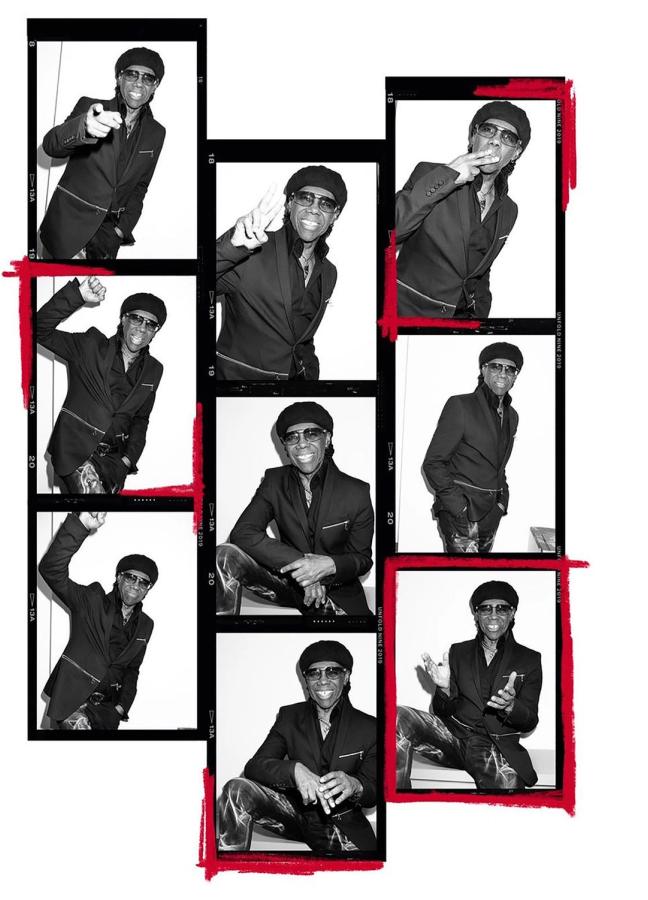

Words: Joseph Bullmore
The first thing you notice is the voice. It’s like maple syrup poured over fine mahogany on a hot gravel driveway. It spells cool with six “O’s”. You want to spread it on toast. It’s the kind of voice that makes every anecdote richer, funnier, more conspiratorial — like a midnight fireside conversation with a healthy bottle of red. And the anecdotes! The anecdotes that spill out of Nile Rodgers could be platinum certified.
First comes the immortal incident at Studio 54. On New Year’s Eve in 1977, at the height of the Manhattan superclub’s pomp, Nile and Bernard Edwards tried to duck the queues by knocking on the stage door. “The bouncer told us to ‘F*** off’, and slammed the door in our face!” remembers Nile. So he and his writing partner decamped to a nearby apartment with a couple of bottles of Dom Perignon (or “rock and roll mouthwash” as they called it) to write a protest song about the club. “F*** off!” they hollered over a skittering rhythm guitar: “F*** Studio 54!” By the time the champagne wore off (and the expletive had been replaced with a more radio-friendly “freak out!”) they knew they had a hit. “Le Freak is still the biggest selling song in the history of Atlantic Records,” Nile grins. Rejection has never tasted so sweet.

Then there’s the story of Let’s Dance — David Bowie’s genre-confounding number one record from 1983. When Bowie first played an early version to Rodgers, one morning in Switzerland, it was a moody, dark, folky track — wistful and willowy. “Nile, darling, I think this is a hit!” Bowie had said. At first Rodgers thought he was being tested. “I just didn’t get it!” he remembers.
Rodgers asked Bowie if he could put together his own arrangement of the song. Over the course of an afternoon, in just a few deft chess moves, the producer transformed the plodding Bowie track into a sultry inferno of funk. When Rodgers re-enacts this transformation, step by step, on his famous white 1960 Fender Stratocaster in front of us, the atmosphere in the room builds to an electric hum. “And that’s how you make a hit,” he laughs.
And then, of course, there’s We Are Family — the anthem that didn’t so much spawn an anecdote as build a legacy. Nile’s voice drops down a semitone and the gravel softens. “After the two planes crashed into the World Trade Centre towers, we were trying to do something that could jump-start the healing process,” he explains. “I had donated my song We Are Family because we were trying to give people a good feeling and inject some happiness into the effort.”
“It was just going to be a situation where I donated one of my biggest songs, which generates a couple of million bucks a year, to the cause. What wound up happening is that it took off by itself.”
The song was originally written for Sister Sledge in 1978 as an anthem of familial solidarity. “We knew it was unique, but we didn’t think that other people would adopt it,” Nile tells me. “But there was this sort of multiplier effect. Every year we have the World Series, the baseball championship. And the team that won the World Series one year adopted that song as their theme song.
“I kept thinking to myself: ‘this doesn’t even make any sense’. I see these big burly guys with these huge butts standing over the home plate, ready to hit a baseball out of the park. And they’re singing ‘I got all my sisters with me!’ But it was the family part that resonated.”
In the days following 9/11, that note of unity took on a new poignancy. Rodgers assembled a super group of musical luminaries seemingly out of thin air — a kind of phone-tree Band Aid with extra sequins. “I’ve found that musicians in particular are some of the most altruistic people I’ve ever met in my life,” he says. “Whenever there’s any type of emergency or cause, musicians are often the first to respond. It seems like you can round up the musical community very, very quickly.” They released a charity record to help in the immediate aftermath.

“But somehow I felt like I wanted to do something that had longer legs than just dumping a bunch of money out there.” So, with his life partner Nancy Hunt, Rodgers built a foundation named after the song — an institution from the institution.
“When we decided to become a foundation, we wanted to have someone to honour. Our first honoree was a 13-year-old poet, Mattie Stepanek, who had been on the New York Times bestseller list over and over again,” says Rodgers. “He had a very large voice because he had made fans out of Oprah Winfrey, Larry King, Jerry Lewis. When he passed away we thought: what if we could find other kids like that who just didn’t have the big voices, but had that same focus, drive and determination. So that’s what we set out to do.”
Today, the foundation empowers young people around the world and guides them on their many and multiple missions. In January, We Are Family announced its newest cohort of Teen Leaders — a curation of inspirational young figures from 18 countries on six continents. Between them, they are engineering sustainable skyscrapers, developing urban gardens, healing relationships between communities and the police, and developing tools to detect serious illnesses.
“It’s different to the activism that was very vibrant in my era — back then it felt like it had a more direct feeling in our lives. It was frontal,” says Rodgers. “Whereas now the activists are looking down the road.”
Rodgers’ biggest hope now, he says, is for the foundation to become more famous than the song after which it’s named. That sounds about right. Rodgers adores the songs he’s written, but the Foundation seems to resonate even deeper. “I’ve always just been motivated to help people. That’s just what my childhood was like. We lived by the golden rule — I just didn’t know any other way. We were always taught to be kind.
“My parents were bohemians, beatniks — really cool. They spoke with this certain patois, and this vibe, and they were almost like spoken word poets. Even though my biological father was black, the father that raised me was white — it was just this cool household. And everything was copacetic, and everything was cool. So it’s natural for me to help people. It’s almost like people’s religions or football teams,” he says. “It’s just how I am.”
Want more musical insights? Luke James talks making music with a new mindset…
Become a Gentleman’s Journal member. Find out more here.


